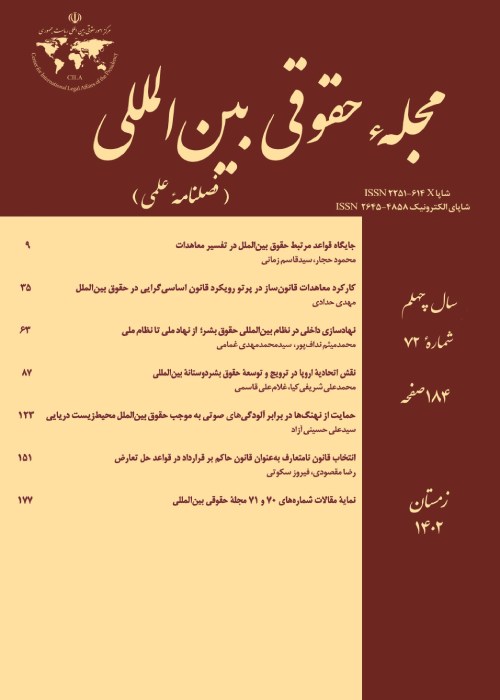Conflict of Laws In Contracts (The Law Governing the Contractual Obligations and the Party Autonomy)
Author(s):
Abstract:
Every time a court deals with a legal relation of a foreign element, the issue of conflict of laws raises i.e. the court must decide amongst the relevant laws, which law will govern or will be applicable to that relation. While this issue is an independent subject in Common Law systems, in some other systems, particularly in Civil Law, it is a part of private international law. The two titles “conflict of laws” and “private international law”, however, are misnomers and do not match with what is meant by them, but both are a body of rules of domestic law which have been enacted and created to deal with legal relations with a foreign element.This article is specifically related to conflict of laws in contracts (with foreign element, or so - called international contracts) and it only deals with the law applicable to contractual obligations and the basis and rationale of the rules of the conflict in this area. Conflict rules of each system of law have its own basis and rationale. Some systems are rigid and inflexible and see “state sovereignty” as the basis of their rules of law and choose such rules as the law of place of conclusion or place of execution of the contract, or the law of the country of nationality of the parties to the contract; and some are flexible and give greater value to the will of the parties. A survey of modern laws of many countries and also the rules of relevant international documents and international organizations reveals that freedom of will of the parties or, “party autonomy” is the prevailing rule in many fora. Of course, no legal system has accepted it unfettered, and different countries have imposed different restrictions on it.In fact, nowadays the “party autonomy”, is a basic principle and as the basis for conflict of laws rules in contractual obligations with some restrictions is the most suitable rule amongst all other rules and, this is in the benefit of the parties to international contracts and can not prejudice the interest of States concerned.
Language:
Persian
Published:
International Law Review, Volume:22 Issue: 32, 2005
Page:
7
magiran.com/p237209
دانلود و مطالعه متن این مقاله با یکی از روشهای زیر امکان پذیر است:
اشتراک شخصی
با عضویت و پرداخت آنلاین حق اشتراک یکساله به مبلغ 1,390,000ريال میتوانید 70 عنوان مطلب دانلود کنید!
اشتراک سازمانی
به کتابخانه دانشگاه یا محل کار خود پیشنهاد کنید تا اشتراک سازمانی این پایگاه را برای دسترسی نامحدود همه کاربران به متن مطالب تهیه نمایند!
توجه!
- حق عضویت دریافتی صرف حمایت از نشریات عضو و نگهداری، تکمیل و توسعه مگیران میشود.
- پرداخت حق اشتراک و دانلود مقالات اجازه بازنشر آن در سایر رسانههای چاپی و دیجیتال را به کاربر نمیدهد.
In order to view content subscription is required
Personal subscription
Subscribe magiran.com for 70 € euros via PayPal and download 70 articles during a year.
Organization subscription
Please contact us to subscribe your university or library for unlimited access!


